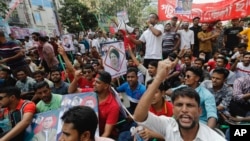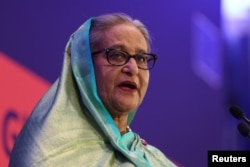The national poll body of Bangladesh said Wednesday that parliamentary elections will be held on January 7 — an announcement that sparked immediate threats of a boycott from the opposition, which fears the elections will be rigged.
The announcement comes as the country is reeling from widespread violent protests calling for the resignation of Prime Minister Sheikh Hasina.
At least four people, among them a police officer, were killed and hundreds of others wounded in recent demonstrations across Bangladesh.
The leading opposition Bangladesh Nationalist Party, or BNP, whose heads are imprisoned or banned from the country, have called on supporters to reject the results of the next election if Hasina does not step down to make way for an interim government.
The BNP previously boycotted the 2014 election.
Hasina has squarely rejected demands for her resignation. Naming a date for parliamentary elections will only add to the unrest, Abdul Moyeen Khan, a former BNP minister, told Reuters.
Hasina, the world’s longest-serving active female head of state, is now eyeing a fourth straight five-year term. She has drawn scorn from pro-democracy activist groups at home and abroad as her administration cracks down on dissent, arresting thousands of protesters.
Hasina’s main challenger, former Prime Minister Khaleda Zia of the BNP, is under house arrest for what she claims are spurious charges of corruption. Her son Tarique Rahman, who serves as BNP’s chairman, fled the country after prosecutors accused him of crimes he says he never committed.
Hasina, who came into power in 2009, has been criticized roundly by the West. The United States, the top importer of Bangladeshi textiles, said last spring that it would restrict the visas of those hampering free and fair elections in Bangladesh.
Some information for this report was provided by Reuters.






